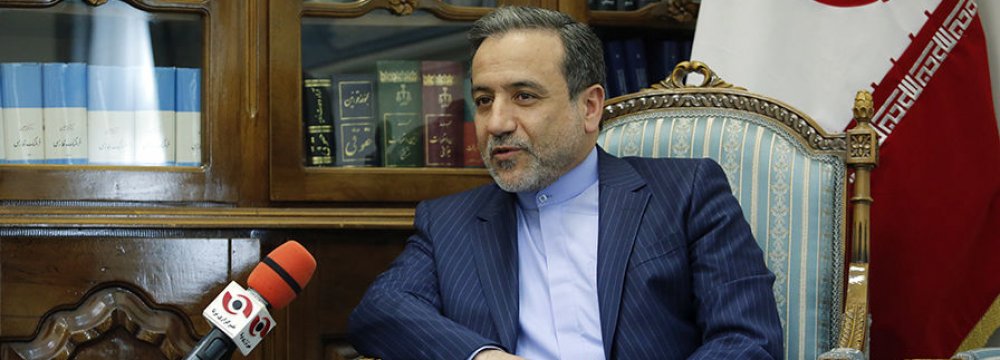
US Exit Would Kill JCPOA

"If the US exits the JCPOA, there will be no JCPOA anymore," Abbas Araqchi said in a Monday interview with state TV, referring to the historic deal by its official name, the Joint Comprehensive Plan of Action.
Araqchi was part of the Iranian team of diplomats engaged in about two years of negotiations with major powers that produced the action plan.
It swapped time-bound curbs on Tehran's nuclear activities for relief from nuclear sanctions that had battered the Iranian economy for over a decade.
The landmark agreement enjoyed the backing of former US president Barack Obama but is facing an existential threat from his Republican successor, Donald Trump.
Trump has criticized the poor performance of Obama's negotiators during the nuclear talks and has called for a more restrictive nuclear deal and new constraints on Tehran's missile development and regional clout, issues that are not covered by the JCPOA.
In a statement on Jan. 12, the Iran hawk signed waivers of sanctions that were lifted as part of the nuclear deal but said he would not do so the next time, due in four months, unless his conditions are met.
He said his decision to extend the sanctions in May hinges on a fix to the existing nuclear deal from the European signatories and the US Congress.
He asked them to draw up a side deal imposing restrictions on Iran's non-nuclear activities.
Otherwise, he warned, he would not hesitate to withdraw from the action plan.
Trump's Aspiration
Araqchi said Iran's vigilance has thwarted Trump's policy to provoke it into violating the pact.
"It was Trump's aspiration that we walk out of the JCPOA. The best-case scenario for America is that the JCPOA gets torn apart at the expense of Iran," he noted.
"If Trump wants to rip up the JCPOA, he would have to tear up the Security Council resolutions too. Iran has denied it the pretext to do so."
The widely supported deal is enshrined in Resolution 2231 of the UN Security Council.
Araqchi urged the European powers to resist Trump's excessive demands on Iran.
"The Europeans' position on the JCPOA has been good so far, but I don't know what they will do in the future… I hope Europe will stick to its JCPOA stance. It is up to them to decide."
The nuclear pact's European signatories, namely France, Britain and Germany, have welcomed Trump's call to limit Tehran's non-nuclear activities but have opposed his demand for a renegotiation of the deal.
Iran has ruled out a reopening of the deal, stressed that its missile program is of a purely defensive nature and dismissed accusations that its regional activities are destabilizing, which positions were reasserted by Araqchi.
A working group of experts set up by the three European parties to the accord, namely Germany, France and Britain, and the United States, has already begun discussions on amending the international agreement.
Reversible Curbs
Araqchi said Trump's hardline stance against the Islamic Republic and the deal is meant to counter its growing clout that the US sees as a rising threat to its regional interests.
"The Americans believe that Iran has grown too powerful… and seek to restrain it, including by attempts to scupper the JCPOA."
Araqchi reiterated the Islamic Republic's stance that it has geared up to deal with the aftermath of any possible decision by Trump, stressing that all the curbs on Tehran's nuclear work are "reversible".
The nuclear negotiator made it clear again that Iran would stick to its JCPOA commitments as long as the deal is assessed to be serving its national interests.
"We will stay in the action plan as long as it benefits us."


Trump weighs using $2 billion in CHIPS Act funding for critical minerals

Electra converts debt, launches $30M raise to jumpstart stalled cobalt refinery

Codelco cuts 2025 copper forecast after El Teniente mine collapse

Barrick’s Reko Diq in line for $410M ADB backing

Abcourt readies Sleeping Giant mill to pour first gold since 2014

SQM boosts lithium supply plans as prices flick higher

Pan American locks in $2.1B takeover of MAG Silver

Nevada army depot to serve as base for first US strategic minerals stockpile

Viridis unveils 200Mt initial reserve for Brazil rare earth project

Kyrgyzstan kicks off underground gold mining at Kumtor

Kyrgyzstan kicks off underground gold mining at Kumtor

KoBold Metals granted lithium exploration rights in Congo

Freeport Indonesia to wrap up Gresik plant repairs by early September

Energy Fuels soars on Vulcan Elements partnership

Northern Dynasty sticks to proposal in battle to lift Pebble mine veto

Giustra-backed mining firm teams up with informal miners in Colombia

Critical Metals signs agreement to supply rare earth to US government-funded facility

China extends rare earth controls to imported material

Galan Lithium proceeds with $13M financing for Argentina project

Kyrgyzstan kicks off underground gold mining at Kumtor

Freeport Indonesia to wrap up Gresik plant repairs by early September

Energy Fuels soars on Vulcan Elements partnership

Northern Dynasty sticks to proposal in battle to lift Pebble mine veto

Giustra-backed mining firm teams up with informal miners in Colombia

Critical Metals signs agreement to supply rare earth to US government-funded facility

China extends rare earth controls to imported material

Galan Lithium proceeds with $13M financing for Argentina project

Silver price touches $39 as market weighs rate cut outlook

















